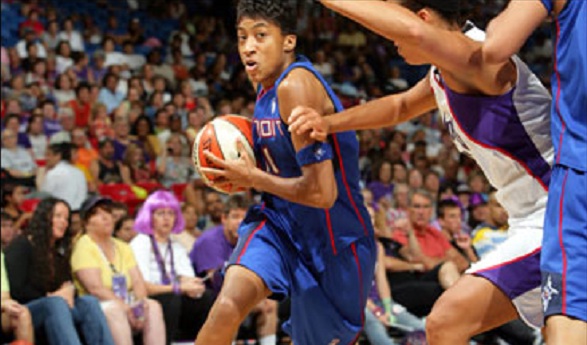
Right Where She’s Always Been
January 3, 2013
By Rob Kaminski
MHSAA benchmarks editor
It was between seasons for WNBA player Stacey Thomas. She sat in her Northwestern University basketball office, where she worked as the Wildcats' director of basketball operations, and listened to a message that she’d heard somewhere before.
“It was before a game in 2004, when an official for that night’s game – Marvin Sykes – stopped into my office and was chatting up officiating,” Thomas recalls. “He gave me recommendations for different associations, and various contacts, and that's when I actually registered and started reading rules books and studying mechanics.”
Suffice to say, basketball was her life. From her days as a prep standout at Flint Southwestern to a brilliant career at the University of Michigan, and ultimately to the sport’s pinnacle with a six-year career in the WNBA, Stacey Thomas had achieved hoops success beyond her wildest dreams.
Yet, it was two instances off the court – mere blips among the thousands of chance meetings and casual introductions in one’s lifetime – which steered Thomas where she is today. Ironically, it’s still on the basketball court.
The conversation with Sykes was the second moment, and it struck a familiar chord with a message she had heard years earlier as a collegiate player in Ann Arbor.
“The first time I ever thought about officiating was when I was playing at the University of Michigan. A little bug was put in my ear during the preseason when officials come in to talk about officiating, the rules changes, how the game is going to be called; that sort of thing,” Thomas recalls. “It was Patty Broderick (professional and collegiate official who currently serves as Coordinator for the Women's Basketball Officiating Consortium). And at end of that talk she told us how officiating could be a great career and a way to stay in the game.”
In the short term, however, Thomas had other ways to stay in the game. You could even say, she stole her way into extending her playing career. As a Wolverine, Thomas set a Big Ten Conference record with 372 career steals, 157 more than any player in U of M history. Her 1,556 points rank fifth in the Wolverine books.
Those numbers and her work ethic led to six seasons in the WNBA, highlighted by a championship with the 2003 Detroit Shock. Thomas played 175 games over six seasons with four teams. And, when her days in “The League” were done, Thomas’ skills took her overseas to stints in Sweden, Turkey and Latvia over three years.
All the while, however, Thomas had her sights set further down the road, for when the game stopped. As it turns out, it hasn’t stopped at all.
“As the years went by and I decided I was done playing, I thought about what I really wanted to do. I knew I wanted to stay in basketball,” Thomas said. “I was an assistant coach at Central Connecticut State in 2004; it was a good experience, but I liked the administrative job at Northwestern better.”
And, of course, there was always that officiating thing she’d heard about.
“While I was looking, I thought maybe I needed to really explore the officiating option,” Thomas said, and she now enters her sixth year as an MHSAA registered basketball official. “As involved as I was with basketball, it gave me the opportunity to stay in the game and be surrounded by the game. It’s a source of pride, and for me it’s the ongoing concept of getting it right and always striving to be better. I want to be professional, set goals and be the best official I can be.”
In other words, she approached officiating in the same manner she attacked opponents on the basketball floor. It’s still the game she’s known her whole life, just from a different perspective.
“As a player, I was around a lot of different coaches and a lot of different teammates, and they all have their own personalities. Understanding that really helped in the transition to officiating,” Thomas said. “You learn to pick your battles and to take things in stride. You can't take things personally. Some coaches try to rattle you by being vocal and boisterous, and others are sarcastic and joking. As a player or as an official you have to read personalities. Playing the game helped me learn how to react, speak to them, and communicate.”
At times, her fame comes into play as well. It’s not easy to hide when officiating in the same state where Thomas’ star began to rise, and coaches often remind her that she used to be on the floor reacting to, rather than blowing, the whistle.
“I am a very laid-back individual, and it takes a lot for me to get rattled, so I use that to my advantage. I might hear from certain coaches, ‘Come on, you played in The League; they didn't call that in The League,’” she laughs. “I just take it for what it is, whether they are trying to get under my skin, or be humorous. I know as an official to just let them have their say.”
The former prep all-stater who finished second in Michigan’s “Miss Basketball” voting as a senior in 1995, also was a three-time high jump champion and ran cross country at Southwestern. She hasn’t totally left track and field behind either, as she is a registered track & field/cross country official with the MHSAA as well.
Thomas, who now resides in Novi, regularly works boys and girls high school basketball in the Metro Detroit Area, and runs on Michigan’s community college circuit and at the NAIA level in the Wolverine-Hoosier Athletic Conference. The competitive fire that drove her as a player transfers to her uniform in stripes, as she eventually hopes to land NCAA Division I assignments.
“My playing experience helped me learn that you’ve got to pay your dues. You’ve got to work hard and have patience,” Thomas said. “I know that there are plays I have to still see over and over and over, so I will get them right on a consistent basis. I need to get to the camps, continue to learn the rules book, and my time will come. The more games, the more reps, the more situations, the more you learn.”
It’s a quality and regimen she tries to impress upon up-and-coming officials, and she also expresses that it’s important the many benefits of officiating aren’t lost in the quest for top games.
“I’ve developed so many friendships and made so many friends by getting into officiating. What better way to have an impact on a sport?” Thomas asks. “I tell people to have fun, enjoy it and work hard. Most of all, I always tell them being compensated is a bonus for doing something you love to do.
“Sometimes the younger officials get too caught up in what other officials are doing,” she continued. “Who’s got the big games, the pay rates, and so on. I played in The League, and I knew going in I wouldn't just come in and have the best games. You’ve got to put the time in.”
Thomas has noticed impatience not only among young officials, but in the playing ranks as well.
“On certain levels, the speed and physical nature of the game has increased,” she said. “There’s all this talent, but at the same time the players have become a little bit lazier compared to back in the day. Years ago, kids had more passion for the game, because nothing was given to them. They were better listeners to coaches, peers and parents.”
When Thomas shares the floor with today’s high schoolers, they are definitely getting her best effort and maximum attention. She understands what’s at stake, and what the high school game is all about. It’s why she accepts games nearly every night of the week during the season, and why she relishes those weeknights in the gyms.
“First of all, it's a special time in their lives, and it’s their turn to shine and to play at a high level and to be seen by their classmates and by the community,” Thomas says. “There’s nothing like that seven o’clock rivalry game, with a big crowd packing the gym, and it’s a close game and you are right there in the fire. It’s an adrenaline rush that pumps you up. Those are the games you strive for.”
Thomas has been on the floor for plenty of those games, and will have countless more in the future. That’s what makes it most special to know where she was this June when she could have been elsewhere. Thomas spent some time at the Healthy Kids Club in Detroit, helping director Mariah Lowson with basketball leagues for kids who ranged from 8 years old to high school age. Officials paid $20 to attend the camp and gain experience that will help them down the road. It certainly doesn’t hurt to see someone there like Thomas helping out.
“The nice thing is, it’s younger kids in the league, so young officials would not be intimidated,” Thomas said. “The motivation for them is to do well in these games, understanding that they can make money doing peewee leagues while continuing to learn. There were some kids as young as 13 or 14 years old, up to 17 years old, working games.”
And there was Thomas, right on the court as she’s always been.
PHOTO: Stacey Thomas drives to the basket as a member of the WNBA's Detroit Shock.
NOTE: This is the seventh installment in the series "Making – and Answering – the Call" detailing the careers and service of MHSAA officials. Click the links below to view others or the blue "Officials" tag at the top of the this story for the entire series plus other Second Half coverage on the subject.
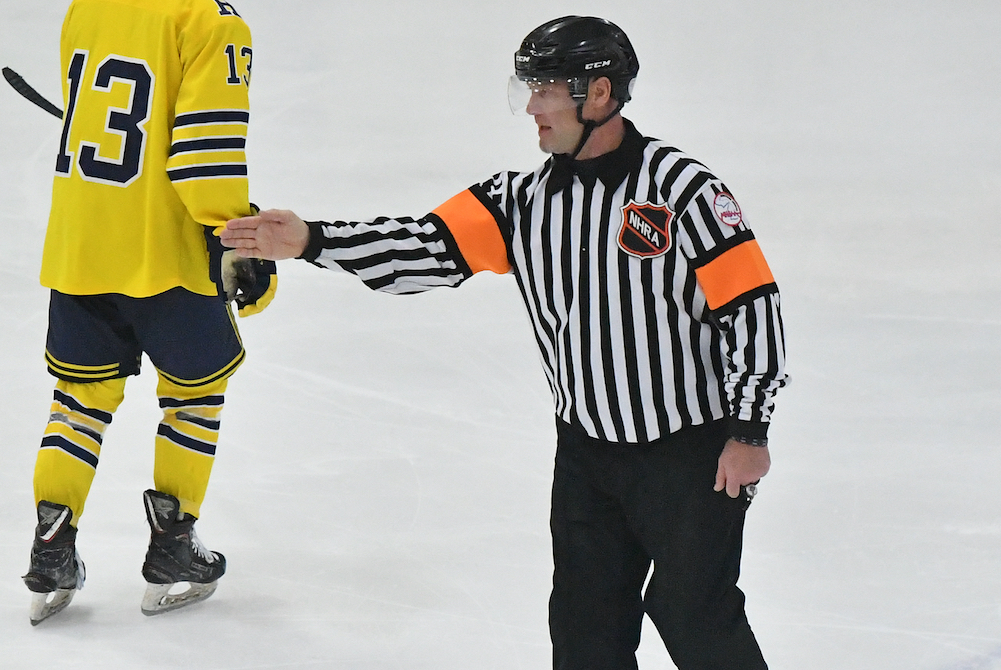
Retired NHL-er Back on Ice to Answer Call - By Making Them
By
Rob Kaminski
MHSAA benchmarks editor
March 16, 2023
The most accomplished skater on the ice during Friday’s triple-overtime MHSAA Division 1 Semifinal hockey thriller between Hartland and Brighton was not wearing the school colors of either team.
In front of a packed house at Plymouth’s USA Hockey Arena, referee Bryan Smolinski was in stripes, just like the rest of his officiating crew.
In his former life, he pulled on plenty of sweaters before lacing up the skates. That happens when one logs more than 1,000 games, tallies nearly 300 goals (274) and close to 400 assists (377) with eight teams spanning a 15-year playing career in the National Hockey League.
So, how did the 52-year-old former star player find himself on the ice last weekend as one of the referees for the pinnacle weekend of this high school season? Good question, even for the man known as “Smoke” during his playing days.
“I was working in youth development programs a few years back and reached out to some Michigan guys I had connections with about other ways to help the game,” Smolinski said. “I called Kevin May just to chat and asked, ‘Hey, how’s your reffing going?’ He said, ‘You know, we’re down a little bit,’ then said, ‘Why don’t you do it?’ I said, ‘Not a chance,’” Smolinski laughed.
Never Say Never
May persisted, imploring his friend to skate with him during a Fall league at Cranbrook in Bloomfield Hills. After eight weeks, once a week, Smolinski had a revelation.
“I’m like, ‘I’m kind of diggin’ this,’” Smolinski said “So, I did all the testing, and the educational part of it, and I really enjoyed it. I got with Danny (DiCristofaro) and his group, and he put me in as much as he could, and I really started to get my feet wet.”
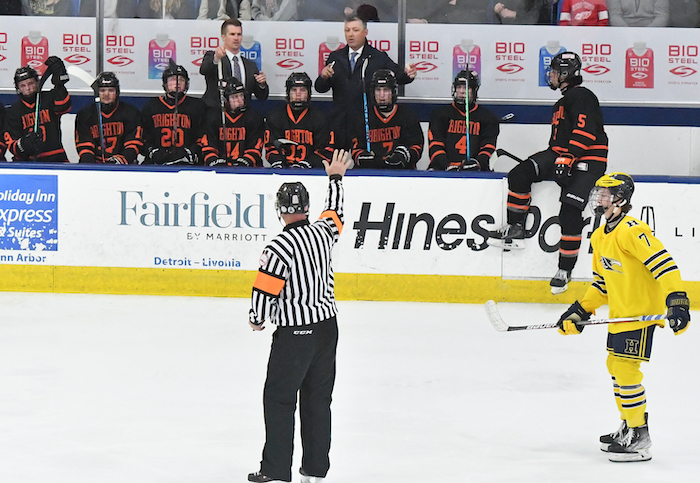 DiCristofaro is the assigner and referee-in-chief for the MHSAA’s Northeast Hockey Referees Association, and he has seen Smolinski’s growth first-hand.
DiCristofaro is the assigner and referee-in-chief for the MHSAA’s Northeast Hockey Referees Association, and he has seen Smolinski’s growth first-hand.
“Obviously he’s got great instincts and a feel for the game, along with a wealth of experience, all of which has allowed him to climb the ladder quickly,” said DiCristofaro. “It’s been a joy to watch his growth as an official.”
Fast forward to last Friday, and there were Smolinski and May sharing duties as referees during the MHSAA Semifinal with linesmen Michael Andrews and Thomas Robbins.
In between, there has been a learning curve that still continues, but the jump to officiating was not quite as daunting as his introduction to the NHL.
“I was scared to death. My first game was against Mario Lemieux. I’m in the old Boston Garden and now I’m playing against these guys and it’s their job, and they’re out there trying to make a living,” Smolinski recalled.
The emotions were not running nearly as frenzied for his first game as an MHSAA official, obviously, yet respect came in a different form.
“I couldn’t pick the puck up, I was breathing heavily; it was Kevin and me doing a two-man game in Brighton,” Smolinski recalled. “There were a few high-end kids playing, and I’m thinking, ‘I’m dying here.’ You know, there’s no training for that first time.”
What that experience did, however, was revitalize Smolinski in a new way. His playing career is well documented, not only in the NHL, but around Michigan. He enjoyed an honor-laden career at Michigan State University from 1989-93 before joining the Boston Bruins (who had drafted him three years earlier) at the end of the ’93 NHL campaign. Even after his final season, with Montreal in 2007-08, he stayed in the game via men’s leagues, or coaching his son, Max.
Smolinski and his wife, Julie, have three daughters: Ashtyn (22), Jojo (16) and Rylen (12), along with Max, whom dad coached for seven years including during a national championship run with a Little Caesars U15 team in 2019. Max, 19, is now playing collegiately at Rensselaer Polytechnic Institute.
So, for Smolinski, officiating offers a new chapter.
“Reffing brought back ... I wouldn’t say love of the game, because that’s always been there; it’s a different side of enjoying the game now. I have no horse in the race, my son’s off to college, my daughters are doing their thing; I wanted to find something new in the game,” Smolinski said. “I’ve coached, and I don’t want to do that. I found this, and I’ve stuck with it.”
Old College Ties
One of the great benefits of athletics at any level are the friendships made. For two kids who met in their first years on the MSU campus and forged a bond that lasts to this day, it’s amazing how their careers reached the pinnacle and have now come full circle.
Wes McCauley, an MSU teammate, is one of Smolinski’s best friends. After numerous years in the minor leagues, McCauley, like his friend, made it to the NHL. But McCauley made it as an official, working his first NHL game in 2003, when Smolinski was nearing the end of his playing career.
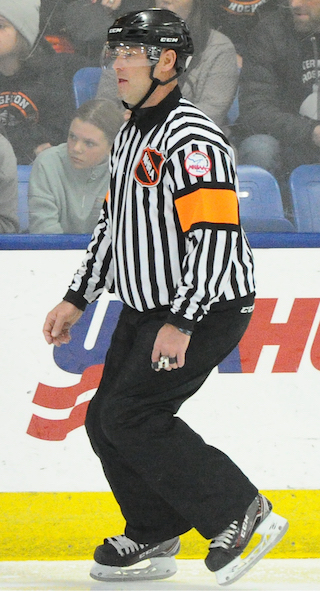 Their games lined up on just a few occasions in the NHL, and the two lobbied hard to have McCauley work Smolinski’s 1,000th career game in his final season with the Canadiens in 2007-08. The request, sadly, was denied by the league.
Their games lined up on just a few occasions in the NHL, and the two lobbied hard to have McCauley work Smolinski’s 1,000th career game in his final season with the Canadiens in 2007-08. The request, sadly, was denied by the league.
On the rare occasions when the friends did share the same ice, less than a handful by Smolinski’s count, it was McCauley who was forced to rebuff any attempts at fraternization. It’s just part of an official’s edict.
“For both of us, it was amazing; it was just great,” Smolinski said. “I’d say, ‘Hey man what’s up?’ and he says, ‘Can’t talk.’ I’m like, ‘What do you mean, we talk all the time.’ Again, he’s like, ‘Can’t talk, get away from me.’ You know, it was just business.”
McCauley then reached the 1,000-game plateau himself in 2018 and is still going strong as a regular selection for playoff duties with nine Stanley Cup Finals assignments, including last year.
So, it should have been natural for Smolinski to go to his old friend immediately for officiating pointers once he joined the ranks, right? Well, maybe not immediately.
“I talk to Wes all the time, but I actually hid it from him right out of the gate because I didn’t want to take his razzing. Eventually it got out, and he was loving it. He started sending me whistles and visors and pants,” Smolinski said, grinning. “And none of it fit, you know, because I’m older and fatter, and he’s so damn skinny. So, I still had to go out and get all new gear.”
Both Sides Now
Having been to the top of his profession, now moving to the other side of that same mountain that his friend McCauley scaled, the respect has grown for those blowing the whistle.
“The preparation for officiating is much more mental,” Smolinski said. “Way more rules oriented. You’re always trying to get away with things that you can as a player; now you have to police that.”
Smolinski has a distinct advantage.
“I know everything they’re trying to do because I’ve done it. I know where you’re going with the puck, I know what kind of breakout you’re trying to do,” Smolinski said. “I have all the instincts, now I just try to stay out of the way and not ruin their game. The most fun is watching the game develop and the ups and downs. For me to be out there and enjoy it with them, that’s the fun part.”
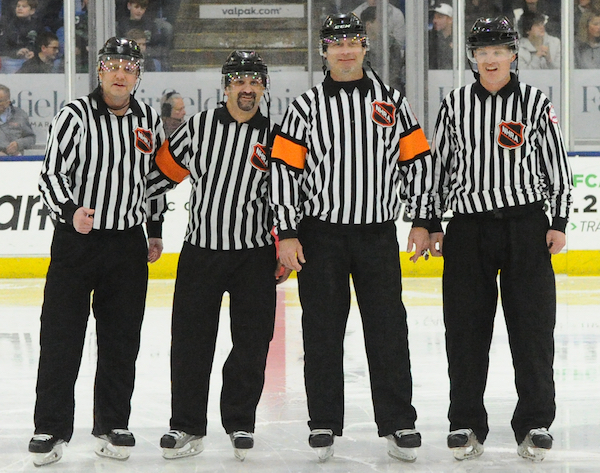 Those who have played hockey at any level have a built-in advantage should they consider the officiating avocation: the ability to skate. Unlike officiating in any other sport, skating is a prerequisite. This makes the pool limited, and almost solely composed of former players. Smolinski offers this advice.
Those who have played hockey at any level have a built-in advantage should they consider the officiating avocation: the ability to skate. Unlike officiating in any other sport, skating is a prerequisite. This makes the pool limited, and almost solely composed of former players. Smolinski offers this advice.
“I prefer sticking with high school because I think there’s more decorum, more administrative structure. Kids are playing for their schools, there’s loyalty there,” said Smolinski. “And there is more accountability. People need report to athletic directors and supervisors. Other levels can be more loosely governed, or a bit more maverick in nature. Moms and dads get involved more, coaches maybe know a little less,” said Smolinski.
He has, in fact, worked a handful of non-school games, and there’s a stark difference.
“I wanted to see what was going on, and I see it first-hand,” Smolinski said. “There are some crazy people and parents out there, and these guys are getting absolutely tortured. I’ve been tortured. There has to be a level of respect for what officials do. I think schools can rein that in a little more. All the guys I’ve met give up a lot of time and work hard because they love to do it and love the game.”
All sports need an assist from school administration and from those who once played the games to keep the officials recruitment moving in the right direction. People like Smolinski can help.
“He clearly doesn’t need to do this, and that’s what makes it so fantastic,” DiCristofaro said. “We need more people who have played – at any level – to do what he’s done and stay in the game as officials.”
Smolinski continues to promote the game in other ways as well. Currently, he is involved in the NHL’s Learn To Play initiative, which aims to inspire youth and welcome more families into the hockey community.
“We work hand-in-hand with the NHL Players Association for player development and industry growth,” Smolinski said. “Ages 5 to 9 are introduced to hockey, get head-to-toe gear and instruction, and meet some former players.”
The idea is to have fun first, which can translate into years and maybe even a lifetime in the sport. It’s a lifetime that has given Smolinski so much and continues to do so as he watches it unfold for others from his new vantage point.
PHOTOS (Top) MHSAA official Bryan Smolinski signals during Friday's Division 1 Semifinal between Brighton and Hartland. (2) Smolinski, a retired NHL standout, communicates with the Bulldogs' bench. (3) Smolinski keeps watch during game play. (4) Smolinski, third from left, with his crew: Michael Andrews, Kevin May and Thomas Robbins.

